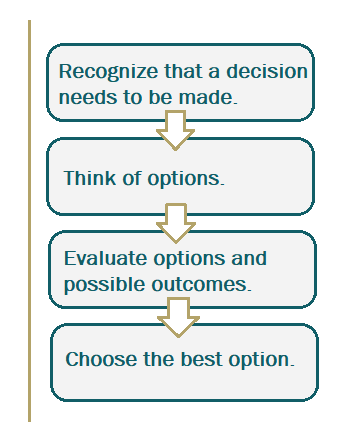The idea that some children are natural born leaders is a myth. On the contrary, these 5 characteristics of a good team leader can be learned at a young age. Whether your child wants to lead the football team through an undefeated season, lead the scholastic bowl to the finals, or simply lead themselves to accomplish their own goals, these five leadership qualities are essential for their success as leaders.
- Self-confidence
- Decision-making skills
- Effective communication skills
- Courage
- Strong Morals (Accountability, Humility, Integrity)

1. Self-confidence
Francisco Dao, leadership strategist for INC.com, once said:
“Self-confidence is the fundamental basis from which leadership grows. Trying to teach leadership without first building confidence is like building a house on a foundation of sand. It may have a nice coat of paint, but it is ultimately shaky at best.”
Self-confidence is the foundation of leadership and one of the 5 characteristics of a good team leader. After all, leaders must have followers and no one will follow someone who doubts their own skills and competence. Rather, team members seek a leader who believes in themselves and in their ability to make good decisions.
Additionally, a self-confident leader will naturally possess many other important leadership qualities like decision-making skills, effective communication, and courage. If you want your child to lead successfully, first, teach them self-confidence.
How to teach self-confidence

According to coaching professional Wayne Goldsmith, self-confidence comes from the combination of self-belief and evidence. Since self-belief is mostly a result of their past experiences at home and mostly developed by the age of ten, he argues for an evidence-based approach to develop self-confidence. The best way to do this, he claims, is to create an environment where the chances for success are high.
This means, to teach self-confidence, you should set goals that your child can accomplish. Don’t set your child up for failure. Give them challenges within their range of talent or skill. Then, praise your child for their accomplishments. Show them that your proud of their work. Use language like, “I knew you could do it!”
TAKE AWAYS
To teach self-confidence:
- Allow your child to do things for themselves.
- Celebrate their success after accomplishing tasks on their own.
- Set goals that your children can accomplish.
2. Decision making skills
It’s inevitable that a leader will be faced with many decisions which is why good decision making skills is one of the 5 characteristics of a good team leader. Some decisions will be small and personal. Other decisions will be great and will impact the entire team. What differentiates a good leader from a mediocre leader is the simple ability to choose the best option. Successful leaders aren’t afraid of making decisions because they know how to evaluate options and choose the best one.

How to teach good decision-making skills
The best way to teach decision-making skills is to regularly expose your child to situations in which they must make decisions. Either let your child make their own decisions or help them to complete the decision-making process.
- Define the subject matter of the decision to be made (whether it is a problem, challenge or an opportunity)
- Identify the number of options that may be taken in respect of the decision
- Analyse the benefits, risks, opportunities and threats of each option (using the SWOT method or any other methods of analysis)
- Select, based on informed knowledge, an appropriate option or solution
- Implement the chosen option or solution
- Review and assess impact of decision
- Modify the course of action, as necessary

For example, you can let your child decide their own bedtime. This might seem like a dangerous amount of freedom, but if you lead your child through the decision-making process, you might find that they choose a bedtime that you also find suitable. If they choose an unreasonable bedtime, they will suffer the consequences, reevaluate, and choose a better bedtime. This will help them become more successful decision-makers.
Another way to expose your child to decision-making, and especially decision making for a team, is to have your child help you make decisions. Let your child lead you.
For example, you could be trying to decide when to go for a run. You might say, “I want to go for a run today. Do you think it’s a better idea to go now, or should I wait until after dinner? What do you think?” Then, help guide them through the decision-making process until they come to a conclusion.
TAKEAWAYS
Successful leaders aren’t afraid of making decisions that can impact the entire team because they know how to evaluate options and choose the best one.
To teach good decision-making skills:
- Either let your child make their own decisions or help them to complete the decision-making process.
- Have your child help you make decisions. Let your child lead you.
SPORTS & EDUCATION PROGRAMS ARE A GREAT OPPORTUNITY TO PRACTICE LEADERSHIP
Learn more about your options by clicking below.
3. Effective communication skills
Effective communication skills is another one of the 5 characteristics of a good team leader. Effective communicators are good talkers and good listeners.
Leaders need to be able to clearly explain their own thoughts and feelings with the team. They also need to be able to explain what they expect from the team.
At the same time, they also need to be effective listeners. Leaders need to listen to the needs and ideas of the team. Collaboration is an important aspect of teamwork and leadership, and it’s impossible without effective communication skills.
Finally, team leaders should learn how to compliment their teammates. Leaders who compliment, are more likely and regularly able to inspire those they lead.
How to teach effective communication skills
The best way to teach your child effective communication skills is to communicate with your child often, expose them to many kinds of communication, and always to listen to their perspective.
For example, invite your child to participate in adult discussions and debates. Whether you’re talking about politics, your neighbor, or the proper way to train your family dog, ask for your child’s opinion. Then, have them explain their reasoning.
Have your child explain often. Ask them to explain what they learned at basketball practice. Ask them to explain what they learned in school. Ask them to explain the rules of a family board game to guests. Better yet, let them teach you what they learned at school. Let them teach you what they learned at practice. Soon enough, your child will be a successful communicator.
Remember that effective communicators are also good listeners. Teach them to listen by setting an example. Listen to your child’s needs and to their ideas.
TAKEAWAYS
Collaboration is an important aspect of teamwork and leadership, and it’s impossible without effective communication skills.
To teach communication skills:
- Communicate with your child often. Invite them to participate in adult discussions and debates.
- Have your child explain often (what they learned at school, for example).
- Listen to your child’s wants and needs and respond adequately.
4. Courage
Aboutleaders.com wrote a great article explaining the importance of courage in leadership. They defined courage as, “Courage is the unwavering feeling within you that allows you to overcome fears, take risks, and go beyond the boundaries where your ultimate goal lies.”
Courage is another one of the 5 characteristics of a good team leader for three reasons. First, leaders need to have the courage to take risks knowing that they’re just as responsible for failure as they are for success.
Secondly, just as leaders are praised more often for their success, leaders are also criticized more often for failure. Courage will help a leader stay positive amidst the criticism.
Thirdly, leaders need to have the courage to question the norm and choose to do what’s right over what’s popular. After all, a courageous leader has the power to make what’s right popular.

How to teach courage
One way to teach courage is to help your child recognize their own natural courage. Children are courageous by nature. They often put themselves in dangerous situations and are not afraid of falling or failing.
When your child first begins to walk, they fall down many times. You don’t criticize them for falling down, you praise them for getting back up and trying again. This pattern should continue throughout adolescence.
Don’t recognize your child’s failure as much as you recognize their bravery for trying something new or difficult. Better yet, encourage them to step outside of their comfort zone and try new things. If and when your child fails, praise them for trying and encourage perseverance.
TAKEAWAYS
Leaders need to be courageous to take risks, accept failure, stay positive amidst criticism, and choose to do what’s right over what’s popular.
To teach communication skills:
- Help your child recognize their own natural courage and praise them for demonstrating it.
- Praise your child’s bravery for trying more than you criticize their failure.
5. Strong Morals (Accountability, Humility, Integrity)
People with strong morals make successful leaders for two reasons. First, morally adept leaders are more likeable and therefore win more followers. People don’t like people who make excuses, who lie, who boast about their accomplishments, etc. People like people who practice qualities such as accountability, humility, and integrity. It’s evident that people don’t follow people whom they don’t like.
Secondly, leaders need strong morals because they set an example for the rest of society. If our leaders are morally corrupt, the rest of the world will follow suit.

ACCOUNTABILITY
Since leaders are decision makers, leaders are held more accountable than the rest of society for both successes and for failures. Successful leaders hold themselves accountable for their mistakes. They accept responsibility for their actions and don’t place blame on other team members or outside circumstances. This is because a leader’s followers need to feel protected. If they feel punished for following the direction of their leader, they will likely stop following.
How to teach accountability
Teaching accountability is quite simple. Set an example for your child. As a parent, you will make mistakes. Nobody is perfect. Admit to your own mistakes. Apologize for your own mistakes.
For example, if you were an hour late picking your child up from school, don’t blame the traffic, don’t blame your chatty neighbor. Hold yourself accountable and apologize to your child. They will follow your lead and practice accountability in their own lives.

HUMILITY
Rick Warren, famous American pastor and leadership mentor, once said, “True humility is not thinking less of yourself; it is thinking of yourself less.”
In other words, a leader must recognize that their success wouldn’t be possible without the hard work and efforts of the team. Society will recognize the success and efforts of the leader. It’s the leader’s job to always recognize the hard work and efforts of the team. By doing so, the team will continue to work hard for their leader.
Lolly Daskal, leadership expert, put together a complete list of all the benefits of humility in leadership:
- They lead to serve.
- They have reserves of inner strength.
- They admit to their mistakes.
- They seek input from others.
- They know themselves.
- They are genuine.
- They invite trust.
- They treat others with respect.
- They understand their limitations.
- They model the way.
How to teach humility
As a parent, set an example. Always recognize the efforts of the team. Whenever you receive help from others, give credit to those who helped you.
For example, when receiving praise for cooking a delicious Christmas dinner, try to recognize all who were involved. Thank Mary for mashing the potatoes. Thank George for bringing a delicious dessert. Thank Steve for keeping you company in the kitchen. Recognizing the effort of the team is a great way to practice humility and to teach your child to do the same.


INTEGRITY
C.S. Lewis, British novelist and academic, once said,
“Integrity is doing the right thing, even when no one is watching.”
Integrity is an important leadership quality because the leader sets an example for the rest of the team. If a leader cuts corners at practice. The team will also cut corners. If everyone cuts corners, practice will be less effective.
Additionally, the team needs to know they can trust their leader. If the team watches their captain lie to their coach, how will they know that their captain doesn’t also lie to them. Integrity is essential to establishing trust, and trust is crucial to a leader’s success.
How to teach integrity
Integrity is taught in the same way that accountability and humility are taught, by setting an example. As a parent, stay honest and express discontent when others lack integrity.
For example, if the children’s menu is for children under twelve years old, don’t ask your 13-year-old child to pretend that they’re twelve years old. Such actions display a lack of integrity. If you cheat, your child will also cheat, and cheaters aren’t successful leaders.

TAKEAWAYS
Leaders need to hold themselves accountable because a leader’s team needs to feel protected.
Leaders need to express humility and always recognize the success and efforts of the team.
Leaders should demonstrate integrity and do the right thing, even when noone is watching.
To teach morals:
Set the example.
- Accountability: Admit to your own mistakes. Don’t make excuses.
- Humility: Always give credit to those who help you.
- Integrity: Be honest, even when noone is watching.
If you teach your child these five characteristics, they’ll be on their way to being a great team leader.
Source: This video was made using Invideo.
Did you enjoy the article?
We created a short summary you can share with your kids! Click the image below to download.
ABOUT ERTHEO
Ertheo is a sports and education agency dedicated to empowering young athletes to reach their full potential as athletes and upstanding citizens.
As part of our mission, we offer only the best sports-education programs in the world.
Our team is available to answer all of your questions and offer expert advice.
Call us at (+44) 203 769 94 43 or (+34) 902 750 359.

